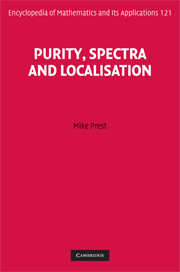Book contents
- Frontmatter
- Contents
- Preface
- Introduction
- Part I Modules
- Part II Functors
- 10 Finitely presented functors
- 11 Serre subcategories and localisation
- 12 The Ziegler spectrum and injective functors
- 13 Dimensions
- 14 The Zariski spectrum and the sheaf of definable scalars
- 15 Artin algebras
- 16 Finitely accessible and presentable additive categories
- 17 Spectra of triangulated categories
- Appendix B Languages for definable categories
- Appendix C A model theory/functor category dictionary
- Part III Definable categories
- Appendix D Model theory of modules: an update
- Appendix E Some definitions
- Main examples
- Bibliography
- Index
Appendix B - Languages for definable categories
from Part II - Functors
Published online by Cambridge University Press: 05 March 2013
- Frontmatter
- Contents
- Preface
- Introduction
- Part I Modules
- Part II Functors
- 10 Finitely presented functors
- 11 Serre subcategories and localisation
- 12 The Ziegler spectrum and injective functors
- 13 Dimensions
- 14 The Zariski spectrum and the sheaf of definable scalars
- 15 Artin algebras
- 16 Finitely accessible and presentable additive categories
- 17 Spectra of triangulated categories
- Appendix B Languages for definable categories
- Appendix C A model theory/functor category dictionary
- Part III Definable categories
- Appendix D Model theory of modules: an update
- Appendix E Some definitions
- Main examples
- Bibliography
- Index
Summary
In this appendix to Part II we define languages, in particular pp conditions, for finitely accessible categories as well as the enriched, “imaginaries”, language for functor categories and their localisations.
Languages for finitely accessible categories
The language for a finitely accessible additive category is defined and the objects of the category are regarded as structures for this language.
This book began with the notion of a pp condition for modules. In Section 10.2.4 thiswas extended from the category of modules over a ring to functor categories, that is, categories of modules over any small preadditive category. Further extensions were described/indicated: to locally finitely presented categories in Section 11.1.5; to finitely accessible categories in Section 16.1.2 (with a detailed treatment for categories of sheaves in Section 16.3.5); to compactly generated triangulated categories in Section 17.3.1. Indeed, any definable category, D, may be represented as a definable subcategory of a locally coherent functor category (see Section 18.1.1), so the notion of pp condition for the latter category may be applied to D. To obtain something intrinsic (18.1.19) forD, however, one should pass to its functor category, fun(D), equivalently (12.3.20), to the category of pp-pairs for D.
- Type
- Chapter
- Information
- Purity, Spectra and Localisation , pp. 656 - 662Publisher: Cambridge University PressPrint publication year: 2009



